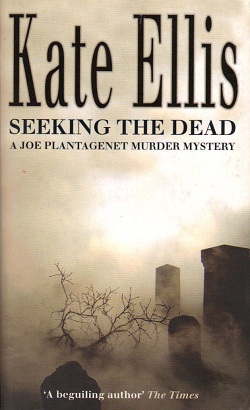 In the city of Eborby (that’s a disguised York, by the way), the so-called Resurrection Man is on the prowl, killing people by burying them alive and then dumping their naked bodies in churchyards. Meanwhile, Carmel Hennessy finds herself stalked by a ghostly figure and the previous occupant of her flat is receiving death threats. Enter former priest DI Joe Plantagenet – is the case tied into the local black magic cult, or is there a more prosaic explanation?
In the city of Eborby (that’s a disguised York, by the way), the so-called Resurrection Man is on the prowl, killing people by burying them alive and then dumping their naked bodies in churchyards. Meanwhile, Carmel Hennessy finds herself stalked by a ghostly figure and the previous occupant of her flat is receiving death threats. Enter former priest DI Joe Plantagenet – is the case tied into the local black magic cult, or is there a more prosaic explanation?
I’ve reviewed three books to date from Kate Ellis – The Merchant’s House, An Unhallowed Grave and my favourite of the three, The Jackal Man – and, like Waterloo Sunset by Martin Edwards, I’m reviewing this because Kate will be appearing at Formby Books this Thursday 15th March evening (5:30 for a 6:30 start). This is the first of three Joe Plantagenet stories (as opposed to the Wesley Peterson series). So, does it live up to the standard of the other series, or am I going to have to hope that Kate doesn’t read my blog if I meet her on Thursday?
It can be extremely hard to judge the quality of a mystery if you actually solve it. For example, if you spot the importance of an off-hand comment when it appears, are you, the reader, being extremely clever or was the off-hand comment, in fact, glaringly obvious in its importance? Just because you may have spotted it, there’s no way that you can tell if the general reader would have done. Ideally, such comments should be of the level that the average reader misses their significance but can remember them being made when the detective reveals their importance in the denouement.
In this case, there are three or four crucial bits of info that the armchair sleuth needs in order to solve the case – fortunately, or unfortunately, depending on how you look at it, I spotted all of them and put two and two together. The identity of the Resurrection Man himself I thought was particularly obvious as soon as the character appeared. Overall, the mystery is clever and well thought out – there’s more to it than the identity of the killer – but as I said, it fell a bit flat for me as I worked it out. I’d love to hear from anyone else who’s read the book – was it that obvious or am I underestimating my sleuthing skills?
Anyway, onto the book itself. It’s sold as being a bit darker than the Wesley Peterson novels and it opens strongly with tales of ghosts from Eborby’s past and features some characters doing some rather unpleasant things to other characters – although nothing graphic is described directly. Plantagenet, being an ex-priest, seems ideally placed to investigate the events. As with Peterson, he’s not the leading officer in the case, but unlike Peterson, Plantagenet is required to do basically all the investigating. In particular, his DCI, Emily Thwaites, comes across as borderline incompetent – her husband seems to have been dragged into events and she makes some very unwise decisions, so Plantagenet is required to be the beacon of common sense. But he would have saved a lot of time if he’d investigated the aforementioned off-hand comments, which, in at least one case, I’d hope that any competent police officer would.
As with the Wesley Peterson stories, there are ties to the history of the area which are done rather more subtly here. But I think I enjoy the more overt archaeological approach from the other series, despite it requiring Wesley’s friend to be digging up something with a parallel to the murder every time someone gets killed. Here, the stories are about the dark shadows in the past of Eborby, but I don’t think I found them chilling enough.
In the end, it’s a decent enough effort as a series opener, but I’m not convinced that I’ll be hurrying back. The Wesley Peterson stories that I’ve read are much stronger than this, and I think I’ll be concentrating on that series from Kate Ellis in the future.

[…] Seeking The Dead by Kate Ellis […]
LikeLike
[…] together, these books have a whiff of the supernatural about them. I was somewhat divided about the first in the series – in part, because I solved it. This, however, was a marked improvement. It’s almost as […]
LikeLike
[…] missed two books in the series – Seeking The Dead and Playing With Bones have been reviewed a while ago, but you’ll have to wait a bit for Kissing […]
LikeLike